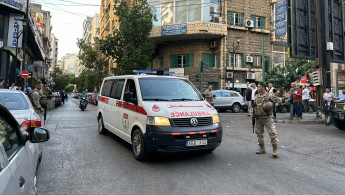Japanese company denies making Hezbollah's exploding walkie-talkies
The Japanese maker of the brand of walkie-talkies linked to explosions targeting the Hezbollah armed group that killed 25 people in Lebanon and injured hundreds of others said it could not have made the exploding devices.
"There's no way a bomb could have been integrated into one of our devices during manufacturing. The process is highly automated and fast-paced, so there's no time for such things," Yoshiki Enomoto, a director at ICOM, told Reuters outside the company's headquarters in Osaka, Japan, on Thursday.
The detonation of hand-held radios used by Hezbollah on Wednesday in Beirut's suburbs and the Bekaa Valley followed an electronic pager explosion on Tuesday that killed at least 12 people, including two children, and injured 3,000 others.
ICOM has said it halted production of the radio models identified in the attack a decade ago and that most of those still on sale were counterfeit.
"If it turns out to be counterfeit, then we'll have to investigate how someone created a bomb that looks like our product. If it's genuine, we'll have to trace its distribution to figure out how it ended up there," Enomoto said.
A company representative for Power Group in Lebanon, which says it is the country's sole official distributor of ICOM, said it did not import the model that detonated on Wednesday and that there were no detonations in its stores or warehouses.
The representative, who declined to be identified, said ICOM discontinued the model that detonated on Wednesday in 2014 and that Power Group only imports models still in production.
The company's Facebook page advertises several ICOM hand-held radios for sale, but not the discontinued models.
Bulgaria probes firm
Bulgaria was looking into the possible involvement of a Sofia-based company in delivering pagers that exploded while being used by Hezbollah operatives in Lebanon, authorities said Thursday.
Questions and speculation have swirled over where the devices came from and how they were supplied to Hezbollah.
"Checks are underway with the tax authorities and the interior ministry to determine the possible role of a company registered in Bulgaria in supplying communications equipment to Hezbollah," Bulgaria's state security agency (SANS) said in a statement.
The agency said there was no record that the devices had entered the European Union legally via Bulgaria, adding that customs had not registered the "said goods".
The comments came after an article on the Hungarian Telex news site quoted anonymous sources saying that a Sofia-based company called Norta Global had imported the pagers and arranged their delivery to Hezbollah.
Taiwan's Gold Apollo, whose trademark appeared on the pagers, denied producing the devices and blamed its Budapest-based partner BAC Consulting KFT instead.
However, Hungary said the company "is a trading intermediary, with no manufacturing or operational site in Hungary."
Norta Global, listed on the Sofia trade register since April 2022, could not be immediately reached.
The company, owned by Norwegian Rinson Jose, recorded revenue of 650,000 euros ($725,000) for management consultancy services last year.
(Reuters and other agencies)




 Follow the Middle East's top stories in English at The New Arab on Google News
Follow the Middle East's top stories in English at The New Arab on Google News
![A group of Palestinians, foreign and Israeli activists gather to participated in an olive picking event on the land in the town of Battir, which is under threat of confiscation by Israel in Bethlehem, occupied West Bank on 8 November 2024. [Getty]](/sites/default/files/styles/image_330x185/public/2182930803.jpeg?h=199d8c1f&itok=__0LgGsa)

![People gathered around the rubble of destroyed houses to search for survivors [Getty]](/sites/default/files/styles/image_330x185/public/2024-11/GettyImages-2184733820.jpg?h=199d8c1f&itok=NiM1LO2f)